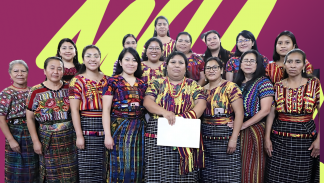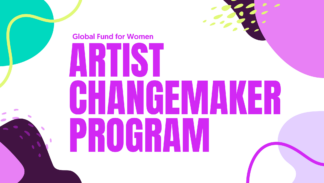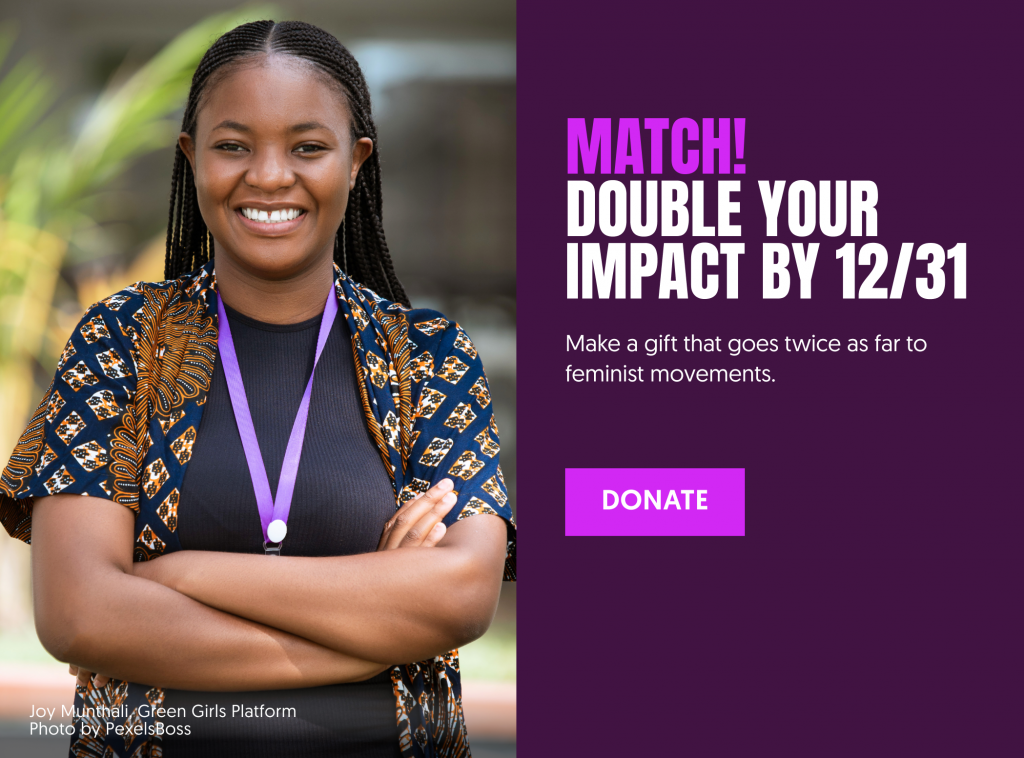Transformative Women's Leadership: An Interview with The Fiji Women’s Rights Movement
Genevieve Sukhdeo is the communications officer and Menka Goundan is the research officer for grantee partner the Fiji Women’s Rights Movement. Global Fund for Women interviewed Genevieve and Menka as part of a learning project evaluating our FLOW program to find out how the groups involved built transformative women’s leadership for social change.
The Fiji Women’s Rights Movement (FWRM) is a multi-ethnic, multicultural non-governmental organization dedicated to promoting democracy, good governance, and human rights on the basis of feminist principles. FWRM’s vision is for the women of Fiji to be free from all forms of discrimination, have equal access to opportunities, and to live in a healthy environment where the principles of feminism, democracy, good governance, multiculturalism, and human rights prevail. The organization seeks to shift the imbalance of women’s socioeconomic and political status by campaigning and lobbying for legislative and cultural change in Fiji, through awareness-raising activities such as publications, meetings, theater work, and outreach to remote rural areas.
A key component of FWRM’s work is promoting young women’s leadership. Its Young Women in Leadership Programme (YWLP) provides a space for young women to fully participate in Fiji’s democratization process, as well as more effectively engage with others at events such as the broader Women’s Forum and various Youth Forum events. As part of their effort to strengthen and encourage cohesive movements, YWLP partnered with four other young women-led groups to better assist young women’s groups in organizational strengthening, capacity building, and movement building in Fiji.
Why is it important to promote young women leaders for your organization now?
Genevieve: We need to strengthen “intergenerational leadership” and dialogue in order to strengthen the movement…so the momentum we are collectively building does not phase out. This is all about intergenerational leaders, and not just young women leaders. We focus on capacity-building and knowledge-based training through a human rights framework and utilizing a feminist lens in all our core programmes such as the Emerging Leaders Forum (ELF) for 18 – 25 year olds, Grow Inspire Relate Lead Succeed (GIRLS) from 10 – 12 years old and through successful collaborations such as the Fiji Women’s Forum and the Fiji Young Women’s Forum. Our graduates and participants then take their learnings and link it to other areas of their lives to further impact their communities.
Menka: Succession planning is important to sustain the movement and the organization. It is important to cultivate young women leaders because when the time comes, they can sustain the movement. In addition, young leaders bring in fresh ideas. It doesn’t mean a radical shift in ideas; rather their ideas can move movements forward.
Reflecting on your organization’s work in promoting young women leaders, what are you most proud of?
Genevieve: Seeing the creation of spaces for young women to have their voices heard and being part of the collaborative, sustainable process to make it happen. This is not just one organization’s vision, but a shared vision of multiple organizations that realized how critical it was that we create these spaces for young women leaders. We’ve worked with other women’s organizations, such as FemLINK Pacific and Diverse Voices and Action for Equality, for the Fiji Young Women’s Forum to ensure that young women have a safe space to express their political views and aspirations, and accord them those opportunities to be actively involved in the women’s movement.
Menka: I am really proud of the fact that research is highly valued in our organization, from planning, to implementing, to evaluating a program. We are very open to learning about our challenges and learning from our experiences. We invest in research and learning in all of our programs, so we improve. That’s how we make the women’s movement vital.
What advice would you share with other young women interested in being involved?
Genevieve: To network and strengthen the connections you make. Connect with other like-minded young women and organizations that offer opportunities for growth. We need to see young women leaders show genuine interest and provide feedback from within their individual contexts. In the face of negative propaganda, we also need to continue increasing the visibility of the organization and get more young women involved.
Menka: It is a considerable journey from considering being involved to the point of getting involved. The big gap is the challenge they face due to societal and political reasons. One advice I would give is if you are sincerely interested, you have go out to find out the avenues of getting involved. You have to challenge yourself. For me there is no one definition of feminism and no one way to promote women’s rights. It’s about finding your niche. You have to find you individuality and yourself.
What advice would you share with another organization trying to promote women leaders?
Genevieve: In Fiji, we have different movements/groups/orgs within civil society utilizing various methods and strategies with young women. We focus on advocacy and legislative change through encouraging political engagement, while others may focus on creating a strong media network of young feminist producers and broadcasters. We all need to find our niche as separate feminist/women’s and human rights based organizations, be clear on what direction we want to take young women to in their feminist analysis, and we need to have the structure in place to carry out the trainings. We need to have a clear vision of our role in the movement, and we also need to involve young women in setting the agenda themselves.
Menka: Find out the needs of your constituency before starting any program. We might think we know what issues young women are facing, what their needs are. But sometimes we are not addressing their needs. It’s very important to find out the social, political, economic, geographic disparity each young women face in each country. There is no one-size fits all program, you need to have flexibility in order to meet the needs of different audience. So to equip young women as leaders, you need to ask them first: what other tools do you need in your weave basket to in order to function as a woman leader?
We need to have a clear vision of our role in the movement, and we also need to involve young women in setting the agenda themselves.Genevieve Sukhdeo



